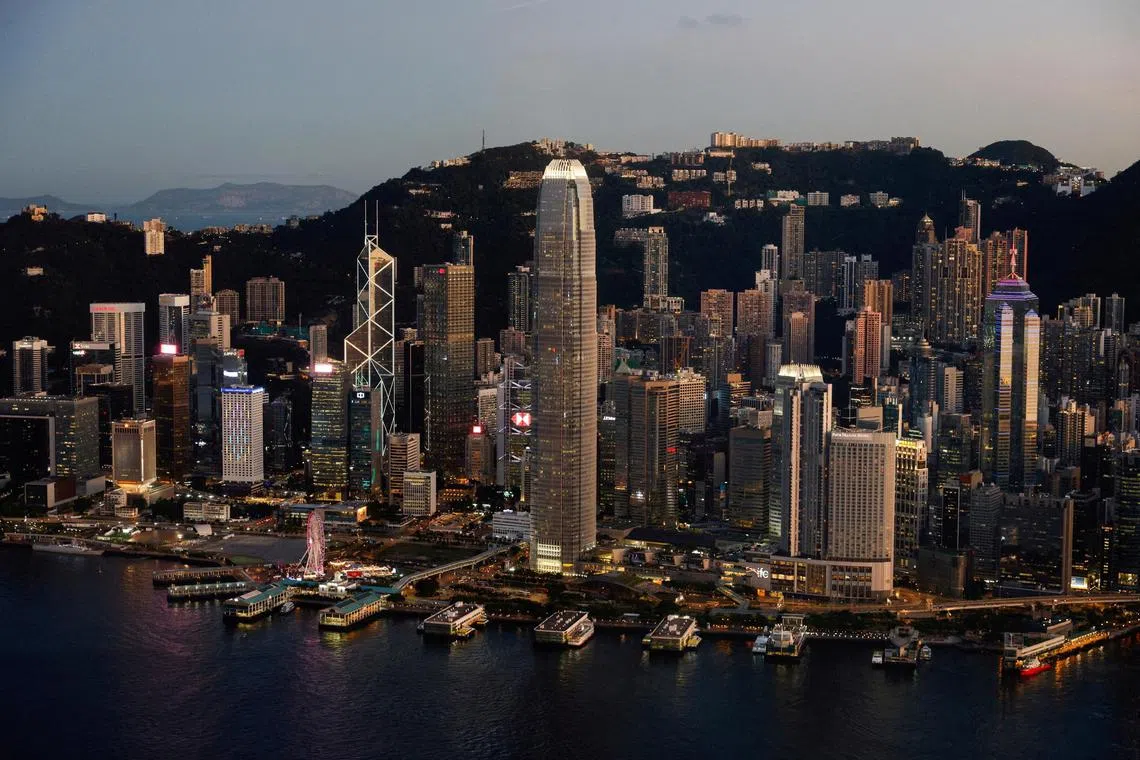Hong Kong strives to prove it can still be ‘Asia’s world city’
Sign up now: Get insights on Asia's fast-moving developments

Average daily arrivals at Hong Kong International Airport have jumped to about 20,000 from a low of just under 70 in March.
PHOTO: REUTERS
Follow topic:
HONG KONG – The beer is flowing again at Hong Kong’s Happy Valley Racecourse. Music pumps from clubs in the neon-streaked Lan Kwai Fong district. Even the Sevens – the annual rugby extravaganza that’s captured this city’s hyperkinetic lifestyle for decades – is back, finally.
After more than two years under Beijing’s stringent pandemic rules, Hong Kong wants to prove that it can still be “Asia’s World City”.
The Hang Seng Index has found a footing after losing roughly half its value. Dealmakers say business is looking up at last.
But behind the hopeful signs are some hard realities. As the pandemic recedes, a new Hong Kong is emerging – one that’s less free, less cosmopolitan and, for some businesses, less vital than the old one.
Since 2020, tens of thousands of people have left.
Meantime, more than 60 international companies have moved their regional headquarters out of Hong Kong. Just over a third of 36 fund management companies surveyed in July had shifted regional or global posts from the city. New visas for foreign financial services workers fell 50 per cent to 1,894 in the first nine months of 2022 compared with three years ago, according to government data.
The pandemic – and Beijing’s strict policies to deal with it
Even in the financial community, an impolitic word can now draw a sharp rebuke from official Beijing. Anxiety is growing. One British national who worked in finance recalled deleting WhatsApp and Signal messages that could be deemed seditious before a routine meeting with local police. His concern: authorities might check his phone. In August, he moved to Singapore.
“It’s hard not to imagine that international business won’t take note of the downward trend in Hong Kong’s autonomy, and continue to assess their presence in Hong Kong accordingly,” said Mr Thomas Kellogg, executive director of the Georgetown Centre for Asian Law.
Despite the buoyant stock market, life is hardly back to pre-pandemic normal. Visitors still need to do multiple mandatory Covid-19 tests. Masks must be worn in public places. The border with mainland China remains closed.
And the local economy, like the rest of China’s, is hurting. The government projects gross domestic product will have shrunk 3.2 per cent this year, its third contraction in four years. Home prices have tumbled 18 per cent from last year’s peak, and Goldman Sachs Group Inc. predicts the slump will only get worse.
The hotel industry, which was hit particularly hard by Covid-19, is struggling to lure workers back.
“We have seen a mass outflow of talent,” Mr Aron Harilela, chairman of Harilela Hotels, said at a briefing to industry professionals and the media in late October. Attracting employees is a “mammoth task”, he said.
“I think the fear and stigma that we have been facing about Covid, where the rest of the world has not been facing, has been stifling us,” he added.
Hong Kong’s Beijing-picked leader John Lee has been trying to burnish the city’s sullied reputation as an international business hub. A big step: rolling back Covid-19 restrictions,
Mr Lee also plans to relax visa rules and reduce the stamp duty on property purchases by non-residents. On Tuesday he scrapped most of the remaining curbs. The reopening of the border with mainland China is expected early next year.
Travellers are returning. Average daily arrivals at Hong Kong International Airport have jumped to about 20,000 from a low of just under 70 in March, according to the Immigration Department, which doesn’t provide data for the pre-pandemic period.
Executive recruiters, who have an interest in luring people back, are predictably optimistic. They say Hong Kong’s long-time selling points – low taxes, good opportunities and access to lucrative mainland markets – are still big draws. It helps that the city’s notoriously high housing costs have fallen.
“I’ve seen a lot of interest from people, particularly expats who left to Europe or London,” said Ms Loretta Chan, Hong Kong-based partner at executive search firm Wellesley Partners, which focuses on the financial services industry. “I’ve seen them come back.”
Mr Alan Schmoll says he’s considering moving back. The former banker lived here from 2009 to 2014. Now based in Melbourne, he visited in November for business and for the Hong Kong Sevens.
The trip, Mr Schmoll says, was a success all around. He got a lot of business done, and partied a bit too much at Boomerang, a club in Lan Kwai Fong, after a Covid-19 test at the door.
“The club was packed,” said Mr Schmoll, who runs an online real estate company. “It was B.A.U. – business as usual.” Bloomberg

